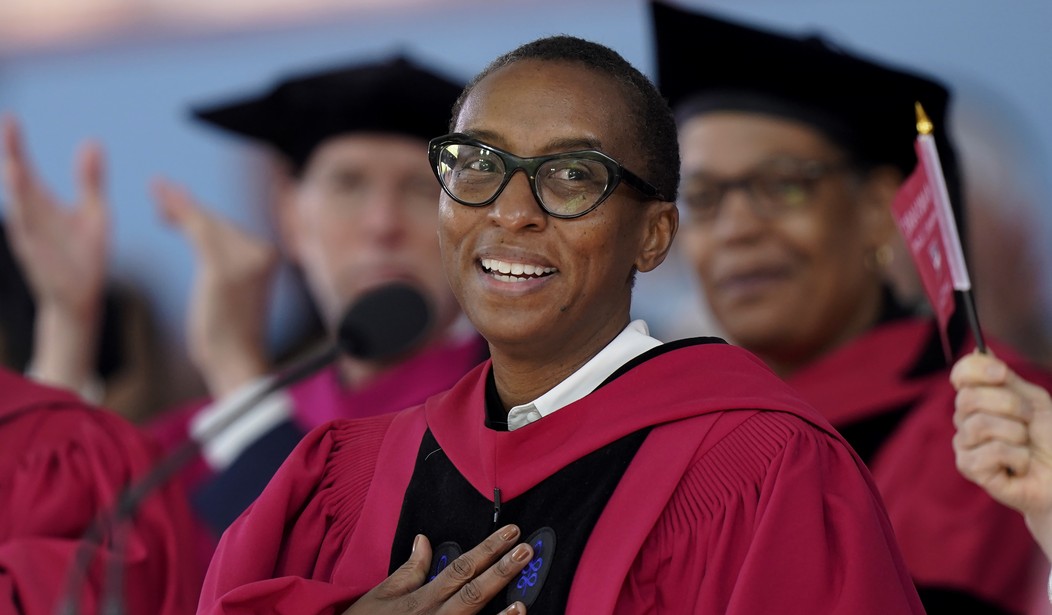Top News
2022 Nobel Prize Winner Blasts Claudine Gay and DEI

I may be among the few who think Claudine Gay’s head is still on the chopping block.
Harvard’s Corporate Board may have expressed unanimous support for Gay, but it’s pretty clear they did so mainly because they didn’t want to appear weak in the face of donor and political pressure to dump her. They likely also feared that Gay would make a huge stink, likely accusing them of racismsexismblahblahphobia because that is her whole shtick.
Not that they have let me in on their deliberations, but these guys are smart and know that Gay is a liability. They just need a more graceful way to get rid of her. Compared to forcing Larry Summers out for stating the obvious, Gay’s ouster would be a no-brainer under most circumstances. Under these circumstances? Pride likely stopped them from doing the obvious.
So I still think her tenure at Harvard will be short and that the Board will find a way to buy her out with some form of “promotion” that makes her look good and gets her out of their hair.
Why? Because Harvard will be taking prestige hits as long as she remains, and prestige is their only real asset as a going concern. They have an endowment, of course, but their power–which is what they care about–derives from prestige. And having a second-rate, plagiarizing scholar who won’t stand up against genocidal maniacs is a bad look.
A great example of the hits that will keep on coming is the criticism aimed at Harvard, DEI, and Claudine Gay by 2022 Nobel Prize winner Dr. Philip Dybvig.
Dybvig, whose specialty in economics brought him to modest prominence, is not known to drop political bombs on a whim. But Gay’s troubles gave him an opening and he seized it.
From Dr. Philip Dybvig, who won the Nobel Prize in Economics last year: “Claudine Gay has power now and she is the oppressor of any group not favored by her and other people in power. This is a common pattern in governments heading for totalitarianism.”https://t.co/uEEp55iXeE pic.twitter.com/UadVd7aaK7
— Christopher F. Rufo ⚔️ (@realchrisrufo) December 15, 2023
Dybvig’s criticism is nominally aimed at Gay, but its target is really DEI and critical theory. He rightly points out that DEI is not about ensuring justice but seizing power and using it to oppress others.
“You had your turn; it’s mine now, and I am going to get revenge” is the underlying message of DEI.
‘‘I realize I have been too pure. I assumed that a lot of people shared my dream (expressed for example by Mahatma Gandhi and Martin Luther King) of ending oppression. However, the dream of most people (especially but not exclusively the oppressed) seems to be becoming the oppressor. This is why there is a strong correlation between abusers of children and people who were abused as children.
Claudine Gay has power now and she is the oppressor of any group not favored by her and other people in power. This is a common pattern in governments heading for totalitarianism. First, say you represent the oppressed. Then you get power and oppress non-favored groups. This leaves you in a morally indefensible position that could not survive given free speech, so you do what you can to destroy anyone (“counterrevolutionaries”) who disagrees with your narrative.’’
This insight is at the heart of Gay’s and others’ insensitivity to Jews, whom they see as oppressors. One can literally do nothing to “oppressors” that is oppressive–oppressors have the power, and any atrocity can be justified as resistance.
This is silly, of course. Power is not determined by being a member of some group. Claudine Gay has power at Harvard and clearly is the least oppressed person there. But she can hide behind her skin color and claim to be oppressed.
Dybvig hit the nail on the head here and calls out the hypocrisy in a difficult way to dispute. Even the reference to totalitarianism is apt–we have Antifa blackshirts roaming our streets using this ideology as an excuse to terrorize people. Look at every college campus, and you can see the mobs intimidating disfavored groups.
And no, that is not an exaggeration. The Editor of the Harvard Law Review is caught on camera doing this to a Jewish student, along with a mob he leads:
More on Ibrahim Bharmal, EDITOR of the Harvard Law Review at @Harvard_Law & @Kennedy_School. See him physically and verbally assault an Israeli student during an anti-Israel protest on campus. Read his NEW Canary Mission Profile: https://t.co/FhgNNbpME6 pic.twitter.com/C49vYh2m9e
— Canary Mission (@canarymission) November 1, 2023
DEI is all about seizing the mechanisms of power and weaponizing them against disfavored groups. It doesn’t oppose discrimination; it is about using it for the purposes of the newly empowered group.
Few academics could do what Dybvig did here, and he could do it because he was so recently awarded the Nobel Prize. Good for him; unfortunately few others could follow his path without risking their careers.
Read the full article here


















